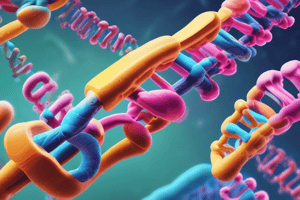Podcast
Questions and Answers
What is the total number of chromosomes in every human cell?
What is the total number of chromosomes in every human cell?
- 23
- 92
- 46 (correct)
- 50
What is the function of the centromere in a chromosome?
What is the function of the centromere in a chromosome?
- It determines the sex of an individual
- It carries genetic information
- It divides the chromosome into two arms (correct)
- It divides the chromosome into four arms
What is the term for having an abnormal number of chromosomes?
What is the term for having an abnormal number of chromosomes?
- Translocation
- Deletion
- Aneuploidy (correct)
- Genetic variation
What is the largest chromosome in humans?
What is the largest chromosome in humans?
What is the term for a segment of DNA breaking off from one chromosome and attaching to another?
What is the term for a segment of DNA breaking off from one chromosome and attaching to another?
What is the role of chromosomes in mitosis and meiosis?
What is the role of chromosomes in mitosis and meiosis?
What is the term for the physical structure of chromosomes?
What is the term for the physical structure of chromosomes?
Which type of chromosomes determine the sex of an individual?
Which type of chromosomes determine the sex of an individual?
Flashcards are hidden until you start studying
Study Notes
Human Chromosomes
Number and Structure
- Humans have 46 chromosomes in every cell of their body, organized into 23 pairs.
- Chromosomes are thread-like structures made up of DNA and proteins that carry genetic information.
- Each chromosome has a centromere, which divides the chromosome into two arms: a short arm (p) and a long arm (q).
Types of Chromosomes
- Autosomes: Chromosomes 1-22, which are not involved in determining sex.
- Sex chromosomes: X and Y chromosomes, which determine the sex of an individual.
Chromosome Size and Gene Content
- Chromosome 1 is the largest, with approximately 250 million base pairs of DNA.
- Chromosome 22 is the smallest, with approximately 50 million base pairs of DNA.
- Chromosomes vary in the number of genes they contain, with some having thousands of genes and others having fewer than 100.
Chromosomal Abnormalities
- Aneuploidy: Having an abnormal number of chromosomes, which can lead to conditions such as Down syndrome (47 chromosomes) or Turner syndrome (45 chromosomes).
- Translocations: When a segment of DNA breaks off from one chromosome and attaches to another, which can lead to genetic disorders.
- Deletions: When a segment of DNA is missing from a chromosome, which can lead to genetic disorders.
Chromosome Function
- Inheritance: Chromosomes carry genetic information from one generation to the next.
- Genetic variation: Chromosomes contain genes that determine individual traits and characteristics.
- Cell division: Chromosomes play a critical role in mitosis and meiosis, ensuring the proper distribution of genetic material during cell division.
Human Chromosomes
Number and Structure
- Human cells contain 46 chromosomes, organized into 23 pairs.
- Chromosomes are thread-like structures composed of DNA and proteins that carry genetic information.
- Each chromosome has a centromere, dividing it into two arms: a short arm (p) and a long arm (q).
Types of Chromosomes
- Autosomes: Chromosomes 1-22, which don't determine sex.
- Sex chromosomes: X and Y chromosomes, which determine an individual's sex.
Chromosome Size and Gene Content
- Chromosome 1 is the largest, with approximately 250 million base pairs of DNA.
- Chromosome 22 is the smallest, with approximately 50 million base pairs of DNA.
- Chromosomes vary in gene content, with some having thousands of genes and others fewer than 100.
Chromosomal Abnormalities
- Aneuploidy: Having an abnormal number of chromosomes, leading to conditions like Down syndrome (47 chromosomes) or Turner syndrome (45 chromosomes).
- Translocations: When a DNA segment breaks off from one chromosome and attaches to another, leading to genetic disorders.
- Deletions: When a DNA segment is missing from a chromosome, leading to genetic disorders.
Chromosome Function
- Chromosomes carry genetic information from one generation to the next, ensuring inheritance.
- Chromosomes contain genes that determine individual traits and characteristics, contributing to genetic variation.
- Chromosomes play a critical role in mitosis and meiosis, ensuring proper distribution of genetic material during cell division.
Studying That Suits You
Use AI to generate personalized quizzes and flashcards to suit your learning preferences.




